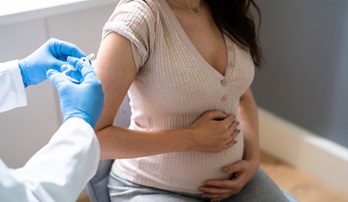RSV VACCINE IN PREGNANCY
Abrysvo® approved for use in pregnancy to prevent RSV infections in newborns
Straight Healthcare
October 2023

Abrysvo, a new RSV vaccine, recently received an indication in pregnant women to prevent RSV infections in newborns through 6 months of age. The CDC recommends the vaccine for women living in the continental U.S. who are 32 - 36 weeks pregnant during September through January. Abrysvo received a prior indication to prevent RSV in adults 60 and older (see two new adult RSV vaccines).
In its pivotal study, 7358 pregnant women at 24 to 36 weeks gestation were randomized to Abrysvo or placebo; the trial took place over 4 RSV seasons. The primary outcomes in newborns measured up to 180 days of age were: (1) medically attended (i.e., seen by healthcare provider in any setting) severe RSV-associated lower respiratory tract illness (RSV with tachypnea, O2 sat < 93%, lethargy, ICU admission, or need for supplemental O2 or mechanical ventilation); and (2) medically attended RSV-associated lower respiratory tract illness. At the end of the study, severe illness occurred in 0.5% of infants born to vaccinated mothers and 1.8% of those born to mothers who received placebo, while non-severe illness occurred in 1.6% and 3.4%, respectively. Hospitalizations for RSV were significantly lower in the vaccine group at 180 days (0.5% vs 1.3%). However, at 360 days, the difference between groups was nonsignificant (1.1% vs 1.6%), which likely reflects loss of maternal antibodies over time. Injection site pain was the most common adverse event, affecting 41% in the vaccine group and 10% who received placebo. Through 24 months of age, 17 infant deaths were reported, five in the vaccine group and twelve in the placebo group. One death in the placebo group was deemed to be related to RSV infection. Interestingly, all-cause medically attended lower respiratory tract infections were not significantly reduced by Abrysvo at any time point over 360 days (14.4% vs 15.3% at 360 days).
Abrysvo significantly lowered the risk of RSV infection in infants born to vaccinated mothers. RSV hospitalizations, the most important clinical outcome, were lower with Abrysvo at 180 days; however, the difference was nonsignificant at 360 days, showing that as maternal antibodies waned, significant illness accelerated in the vaccinated group. Theoretically, delaying infections until infants are older should help them fare better. The fact that all-cause lower respiratory infections were not reduced by Abrysvo raises the possibility of viral competition, where other viruses are able to spread and infect more widely when another one is suppressed. Overall, widespread uptake of Abrysvo will likely have a meaningful impact on RSV burden among infants, but larger and longer studies are needed to confirm its overall effects on morbidity and mortality.
In its pivotal study, 7358 pregnant women at 24 to 36 weeks gestation were randomized to Abrysvo or placebo; the trial took place over 4 RSV seasons. The primary outcomes in newborns measured up to 180 days of age were: (1) medically attended (i.e., seen by healthcare provider in any setting) severe RSV-associated lower respiratory tract illness (RSV with tachypnea, O2 sat < 93%, lethargy, ICU admission, or need for supplemental O2 or mechanical ventilation); and (2) medically attended RSV-associated lower respiratory tract illness. At the end of the study, severe illness occurred in 0.5% of infants born to vaccinated mothers and 1.8% of those born to mothers who received placebo, while non-severe illness occurred in 1.6% and 3.4%, respectively. Hospitalizations for RSV were significantly lower in the vaccine group at 180 days (0.5% vs 1.3%). However, at 360 days, the difference between groups was nonsignificant (1.1% vs 1.6%), which likely reflects loss of maternal antibodies over time. Injection site pain was the most common adverse event, affecting 41% in the vaccine group and 10% who received placebo. Through 24 months of age, 17 infant deaths were reported, five in the vaccine group and twelve in the placebo group. One death in the placebo group was deemed to be related to RSV infection. Interestingly, all-cause medically attended lower respiratory tract infections were not significantly reduced by Abrysvo at any time point over 360 days (14.4% vs 15.3% at 360 days).
Abrysvo significantly lowered the risk of RSV infection in infants born to vaccinated mothers. RSV hospitalizations, the most important clinical outcome, were lower with Abrysvo at 180 days; however, the difference was nonsignificant at 360 days, showing that as maternal antibodies waned, significant illness accelerated in the vaccinated group. Theoretically, delaying infections until infants are older should help them fare better. The fact that all-cause lower respiratory infections were not reduced by Abrysvo raises the possibility of viral competition, where other viruses are able to spread and infect more widely when another one is suppressed. Overall, widespread uptake of Abrysvo will likely have a meaningful impact on RSV burden among infants, but larger and longer studies are needed to confirm its overall effects on morbidity and mortality.
- Abrysvo vs Placebo in Pregnancy to Prevent Newborn RSV, NEJM (2023) [PubMed abstract]
- RSV infection review
